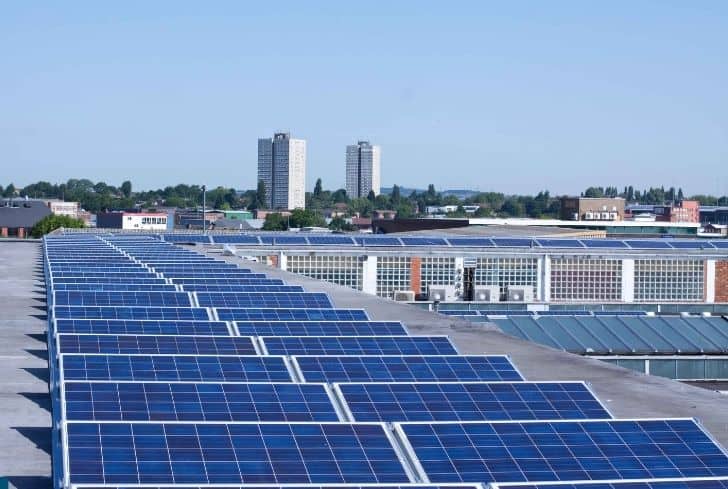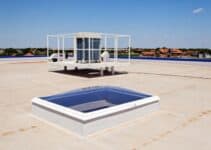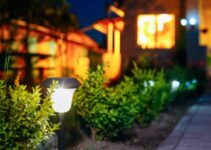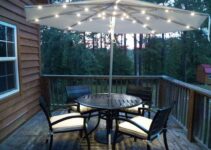Do Solar Panels Attract Lightning?
There are several misconceptions surrounding solar panels and a ton of myths attached to lightning. You are probably well familiar with these two myths; structures with metal or metal on the body attract lightning, and lightning only strikes the tallest objects.
Perhaps, that is why you are worried about your solar panels getting hit by lightning. There is no judgment; everyone knows investing in a decent solar panel costs thousands. Hence, it is a scary thought to think of that thousand-dollar investment getting damaged by lightning strikes.

So, in this write-up, we will mitigate your worries by discarding any untrue myths and discuss everything you might need to know about your solar panels and lightning. So, without further ado, let’s dive right in.
Do Solar Panels Increase The Risk of a Lightning Strike?
Lightning is very destructive and is one of the top natural elements that cause damage to solar panels. Hence, it is understandable for you to worry if solar panels increase the risk of a lightning strike.
People assume buildings with solar panels to be a perfect target for lightning strikes due to the metal racking and solar panel themselves. Unfortunately, this isn’t true as metals or solar panels do not attract lightning. The concept of lightning is too complicated to explain in simple terms, but several factors control lightning.
However, the presence of metal isn’t one of them. Metal has no effect or makes a difference on where lightning strikes. Lightning can strike any object, including trees, mountains, rocks, etc. Furthermore, scientists have found no evidence that suggests that solar panels attract lightning.
Therefore, contrary to popular beliefs, a solar panel doesn’t increase the risk of a lightning strike. The root of this belief is that metal attracts lightning strikes. However, this is untrue as they have a lightning rod design. This means that solar panels have a design that does not attract or repel any form of a lightning strike.
What is a Lightning Strike, And When Does It Happen?
If you have been following the write-up, you have seen the word lightning mentioned a couple of times. Now, what does it mean? You are probably familiar with the term, but if you were asked to explain what it meant, would you be able to? Let’s take a quick look.
We all identify that giant spark of electricity in the atmosphere as lightning. But is that all about lightning? No, it isn’t. Lightning is a sign that temporarily equalizes the charged regions in the atmosphere. It can happen in the sky or strike the earth.
Lightning strikes on earth aren’t frequent but are pretty standard in the United States. Still, the chances of a solar panel getting damaged by a lightning strike are meager. National Lightning Safety Institute reports that lightning will strike at least 1 out of 200 houses yearly.
When Does Lightning Happen?
Lightning occurs when the negative charge in the clouds is attracted to the positive charge in the ground. As a result, the hot air rises to meet cool water vapor to form clouds. Therefore, for lightning to occur, there must be a cloud. Since the temperature is below freezing at the top of the clouds, the water vapor turns into ice.
Over time, the clouds turn to thunderclouds and build up electrical charges as the ice collides. These electrical charges are segmented as the cations; positive charges rise to the summit of the cloud. In contrast, anions; negative charges remain at the base of the cloud.
As the charges grow, they attract each other, and lightning occurs between the charges. As stated earlier, lightning can either happen in the sky or on the earth. Lightning on the ground is called a lightning strike and is accompanied by thunder. However, lightning is seen before the thunder because the light is relatively faster than sound.
Do Lightning Damage Solar Panels?
Lightning poses a real threat to solar panels when hit by one. Although your solar panel’s probability of getting struck by lightning is low, you must take precautions to protect your solar panel. Why?
Lightning is one of the few causes of solar panel damage. It can cause damage to solar panels, and usually, the damage can destroy a huge part of the electricity source and cost you a lot to fix. You might wonder, how can lightning cause damage to solar panels?
Lightning strikes are usually divided into direct and indirect. The latter, which are more common, are slightly better than the former. An indirect strike occurs more often, creating electromagnetic induction that induces a high voltage in the solar panel system.
When passed through wiring to the components, the high voltage can break down the solar panel conductor, the panels, and other system parts. It also has an increased risk of causing sparks that could make combustible material burst out in flame due to the high voltage.
On the other hand, direct strikes are sporadic but severe. Hence, if a flash of lightning hits your solar panels directly, it can render the whole system useless. It does this by melting parts of the panels, which causes damage to the solar system components. Direct strikes also induce high currents, which could cause the solar system to overheat.
Can You Install Solar Panels in an Area That Gets Lots of Thunderstorms?
Lightning and thunder come as a pair. What this means is that all thunderstorms have lightning. However, considering the devastating damage that lightning can have on solar panels. You might worry if installing solar panels in an area with lots of thunderstorms is safe.
Suppose the installation is done with high-quality materials and fixed by a reliable professional. In that case, you can install solar panels in a thunderstorm area with zero worries. All that is required is to ensure that the installer or installation company does a reliable job and considers adequate lightning protection to ensure your solar panel is well protected.
How To Protect The Solar System From Lightning?
The damages of lightning on solar panels are expensive. Therefore, you should not overlook protecting your solar panels unless you have wads of cash you don’t mind spending on repairs. However, if you don’t, let’s discuss how to protect your solar panel system from lightning.
1. Grounding
The most common method of protecting the solar system is by grounding. Grounding is a cost-effective method to protect your solar system and is usually recommended by several professionals. This method is used to divert the path of lightning. A useful rule of thumb is that you cannot control the lightning strike, but you could direct it to the ground rather than to the solar panels.
The protection is sufficient for places with occasional lightning strikes. Plus, it often prevents lightning and is usually recommended by experts as protection whether you live in an area with frequent thunderstorms. However, it would be best to ensure that a professional installs the grounding system because it is integral to the wiring infrastructure.
2. Surge Arrestors
Surge Arrestors protect solar panels by absorbing induced voltage by strikes. These devices either direct lightning to the ground or allow the surge to bypass wiring and components. Ensure that the installer installs arrestors at both ends of any wire connected to your solar panel system.
Several arrestors are widely available for purchase; some are inexpensive and offer little protection. Hence, you must ensure that the appropriate surge arrestors are used for your system.
What To Do If Your Home Gets Hit By a Lightning Strike?
You have probably heard this a dozen times, but getting indoors is the safest thing to do during thunderstorms. Yet, you wonder, what if your home is struck by lightning? What should you do?
It can be a little confusing trying to figure out what to do. Fortunately, houses can withstand lightning strikes without significant and immediate damage. Your property won’t break apart with you in it because it got hit by lightning, but there are other risks such as shock waves, fire, and electrocution.
Shock waves could cause degradation and cracks in buildings. Plus, the fire risk is high when hit by lightning. This natural element can easily ignite flammable materials when current passes through them and starts a fire directly.
Hence, it would be best if you took some precautions during thunderstorms. Some include unplugging all electronic devices and avoiding touching running water to prevent being electrocuted during a storm. However, suppose a lightning strike hits your home. In that case, you should do the following:
- Shockwaves can cause sharp debris to fly around or even make you lose balance. So ensure that everyone is okay and no one is hurt.
- Check for signs of fire such as smell or smoke. Suppose you find one or are in doubt, dial 911. Inform them that your home has been hit by a flash of lightning and evacuate the house until they arrive.
- Call your insurance company after the fire department has assessed your home.
- Once the fire department has passed your home as safe, contact a reliable electrician to check out your home’s wirings and fix any damages.
Frequently Asked Questions
Should You Turn Off Inverters During Light
Inverters are sensitive to lightning, so they should be protected as much as possible. It would help to protect your inverter by using surge protectors and sheltering them. Still, it is advisable to switch off inverters during lightning.
However, you shouldn’t only switch off inverters during severe storms. It would help if you also switched off all other electronic appliances.
Does Thunder Affect The Inverter?
No, thunder doesn’t affect the inverter. However, lightning is accompanied by thunder, and the lightning poses a much more significant risk to your inverter. Severe lightning can lead to overheating or broken wires in the inverter and start a fire.
Hence, it is crucial to keep your inverter protected from the extra current from lightning. Additionally, suppose your inverter is on top of a pole with nothing around it to shade it. In that case, you should ensure that it is adequately protected because it is susceptible to lightning.
Conclusion
The probability of a mountain getting hit by lightning is similar to that of a solar panel getting hit. Thus, solar panels do not attract lightning, and neither do they increase the risk of a lightning strike. However, regardless of the low risk attached to your solar panel getting struck by lightning, you won’t get a second chance at protecting it.
Hence, it would be best to protect your solar panels from getting hit by lightning to mitigate the risks of damage to your solar panels. While you can’t prevent your solar panel from getting hit, you have the power to redirect the current to avoid damaging your solar system.





